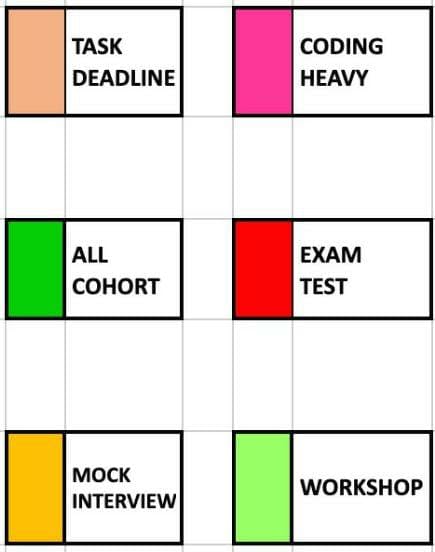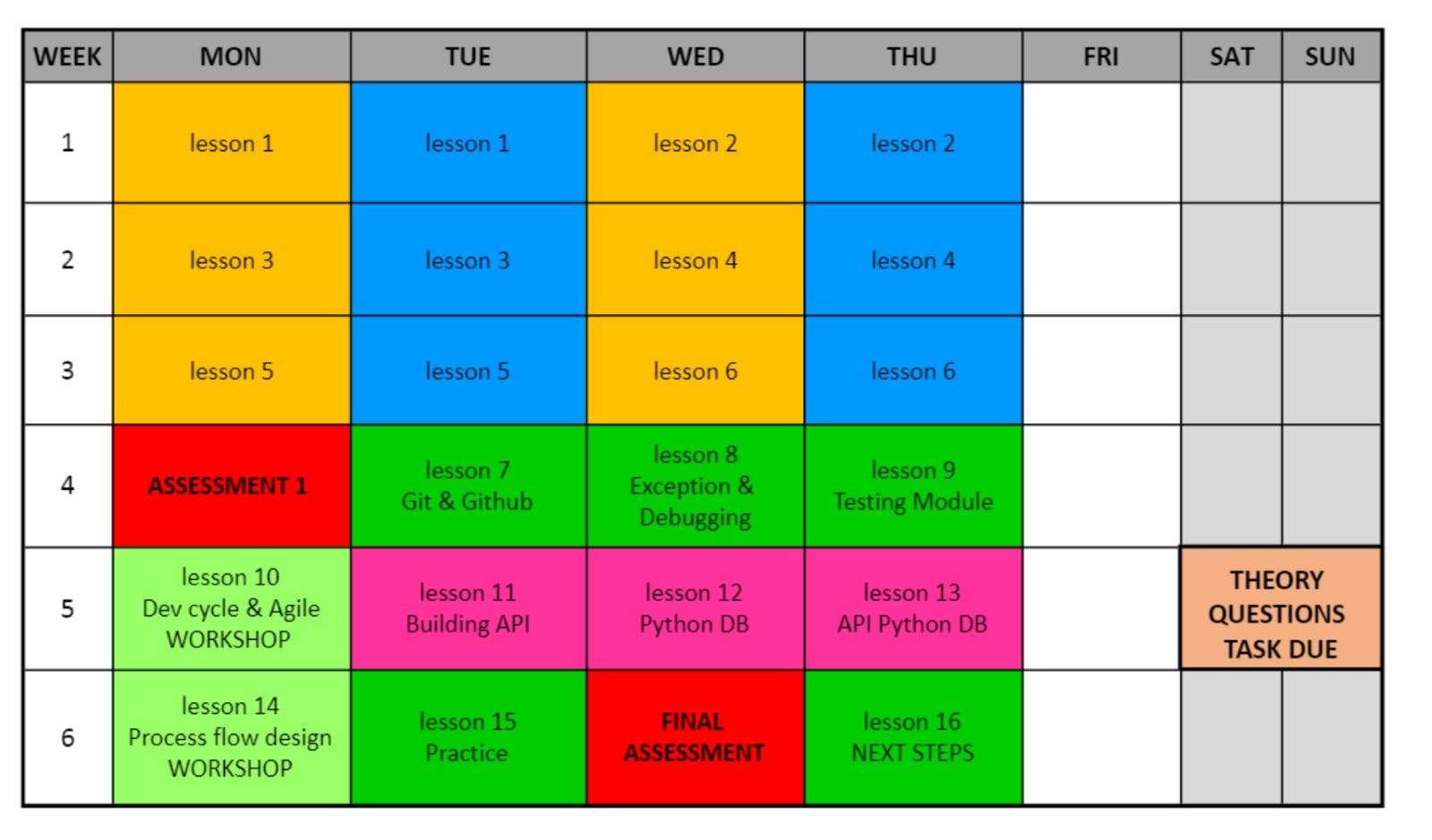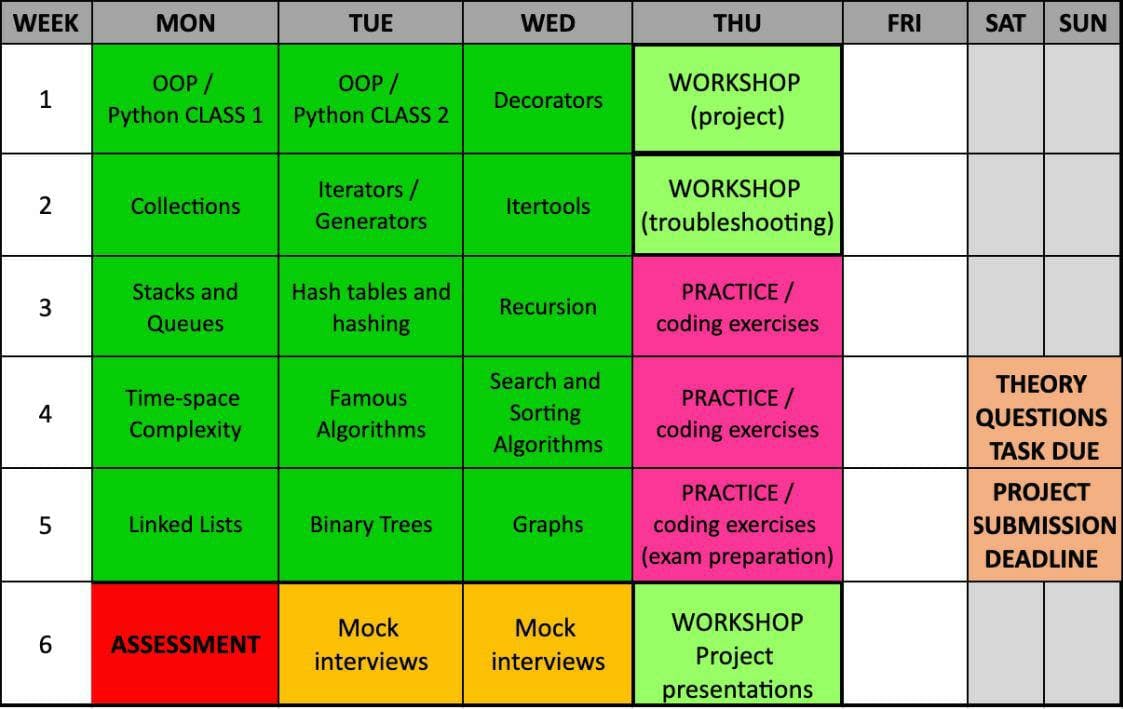Code First Girls Nanodegree Series: Class Schedule
The third article in my Code First Girls Nanodegree series - stay tuned for more!
Welcome back to my third article of the CFG Nanodegree blog series. If you haven't already, please check out the previous Nanodegree series articles here where I introduce the Nanodegree and highlight vital soft skills it taught me.
I had planned on the third article of this series looking at the top hard skills I learned, but it would be best for you to see what the schedule of the Nanodegree was like for me and the different topics I was introduced to first.
DISCLAIMER: THIS WAS ACCURATE FOR THE FIRST COHORT OF THE NANODEGREE IN THE SUMMER OF 2021. THIS MAY HAVE ALREADY CHANGED, BUT I HOPE IT CAN BE OF AT LEAST SOME INDICATION AS TO WHAT SKILLS THESE TYPES OF BOOTCAMPS COVER.
Overview
Foundations
The first 6 weeks of the Nanodegree are described as foundational to ensure that no matter your specialisation, everyone had a good basis in both fields of data and software engineering. The first 3 weeks focused on your non-specialised skill for 2 evenings a week before we all moved into our specialisation classes and focused on general skills and tools such as version control and Github with classes increasing to 4 evenings a week.
As I was on the software course and already passed the Python assessment, my first 3 weeks were spent learning SQL for handling data, taught by the data instructors. Similarly, those on the data course studied Python for software development by the software instructors. I found it really beneficial that all instructors for my cohort were working in the roles many students were aiming for, ie data/software engineer respectively.
Foundational Assessments
The assessment on these skills didn't count towards anything and just encouraged us to revise over everything we had learned so far. The first theory assessment only accounted for about 5% of the overall grade and was mainly Python theory which we were given 2 weeks to complete - very relaxed. The second assessment in the Foundational part of the Nanodegree (named Final Assessment in the images below) accounted for 20% of the overall grade and was mainly Python again, but incorporated elements of SQL too.
Software Engineering Specialisation
As we were already in our specialised groups from week 4 onwards, we moved straight into the specialisation classes, continuing with 4 evening classes a week.
If this sounds confusing, that's because it was..! There was a lot of changing involved in classes and scheduling, but as we were the first cohort this is normal! CFG adapted to our feedback as we went through it and one of the main requests was to be in our specialised groups quicker, which is why we moved to them in week 4 instead of after the first 6 weeks of foundational learning.
Specialisation Assessments
Similar to the Foundational Assessments, the theory in the specialisation was worth 5% and the assessment was 20% overall. This assessment was a timed 2hr assessment, which reviewed everything across the Nanodegree other than the final week of taught classes (Linked Lists, Binary Trees and Graphs in my case).
We formed groups for the final project (between 3 and 5 members) by the end of week 2 so we had 4 weeks to complete it - similar to the other short courses offered by CFG. The project accounted for 40% of the overall grade! It is very important and definitely something to focus on.
The mock interview at the end was a scheduled 30 mins with your group where your instructors asked pointed to discuss your project. They gave immediate feedback at the end on how we did and how we could improve our answers for an actual interview. I found this really helpful and being able to prove teamwork in interviews is really important.
Finally, the course homework throughout the Nanodegree accounts for 10% of the overall grade. Consistently keeping up with it is an easy way to move up a grade even if you find the timed assessments difficult!
Visual Schedule
The schedule for the CFG Nanodegree was split in two and uses the following key:

Foundations
This can be seen in more depth in the schedule for the first 6 weeks below:
Please note the blue and orange colours for the first few weeks just indicate different classes. The orange classes weren't all mock interviews. If I remember correctly, Mon&Wed were basic Python classes and Tue&Thurs were basic SQL classes. You could email and ask to join the basic classes of your specialisation if you wanted the revision.

Software Engineering Specailsation
The following image shows the Software Engineering specialisation schedule for the final 6 weeks:

Conclusion
As you can see from the line up, it was really intense! No rest for the wicked!
Hopefully showing you this schedule gives you an idea of what the CFG Nanodegree bootcamp covers and generally what to expect in terms of intensity.
If you have any questions about the content, feel free to reach out! I'll do my best to answer and cover common questions in the series.
This Series
That's it for the third article of my Nanodegree series. I hope you managed to gain a better understanding of the software Nanodegree, but there's more!
Below shows where we have gotten up to so far:
OverviewSoft skills learnedClass Schedule- Hard skills learned
- Key resources I wish I knew of earlier
- How to make the most of a mentor
- What I wish the Nanodegree could improve for next time
If there is anything not listed here you would like covered. Please let me know! You can contact me here or on Twitter!
The next post will be about key hard skills I learned from the Nanodegree.
